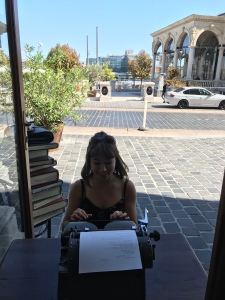‘Do you think, because I am poor, obscure, plain, and little, I am soulless and heartless?’
So questions fiery and beloved heroine Jane Eyre, the title character of Charlotte Brontë’s classic novel. I was struck by her outburst recently, when visiting the little village of Haworth which was home to the four surviving Brontë children from birth to death, and now boasts the Brontë Parsonage Museum as its chief attraction for tourists from around the world.
The current exhibition looks at the life of Branwell Brontë, the less successful brother of Charlotte, Emily and Anne, marking the centenary of his birth, and is curated by Simon Armitage. And although flurries of snow would have made the journey up to the Brontë Waterfall rather more treacherous than picturesque on my recent visit, it is a lovely walk, and the village itself is bustling with quaint coffee shops and quirky gift shops. *
Tour guide blurb over: now, the point. It was the irony of this quotation, in the context in which I found myself considering it, which struck me. Several of the gift shops stocked charming souvenirs and knick-knacks, the majority of which had a distinctly Brontë theme. I was inundated (in the happiest sense), by bookmarks, artwork and stationery which quoted Cathy’s famous declaration of her eternally binding connection to Heathcliff, and Jane Eyre’s bold and beautiful assertions of freedom and self-worth.
But quotations from pitiful Lucy Snowe, a nod towards the little French town of Villette, or even an appreciation of Helen Graham’s strength in her struggle against an abusive husband, were poignantly absent.
Shirley and Agnes Grey remain on my To Read list, but it seems that their characters also lie forgotten under the avalanche of appreciation for Jane Eyre and Wuthering Heights.
Admittedly Monsieur Paul Emmanuel isn’t quite on the heartthrob level of Heathcliff and Rochester. And perhaps Helen’s sorry story is a little too close to home to receive great focus, especially in Branwell’s centenary year, who is believed to have inspired aspects of the controlling alcoholic Arthur Huntingdon.
But what exactly has catapulted Jane and Cathy to everlasting fame, exalted in the eyes of posterity, when Lucy and Helen (alongside Shirley and Agnes) remain humble and relatively obscure? Though certainly neither unloved nor underappreciated by loyal Brontë fans across the world, these other novels’ heroines have not quite managed to achieve the same cultural status as the strong Jane and fierce Cathy, in much the same way that everyone loves Elizabeth Bennet and Mr Darcy of Pride and Prejudice, but Fanny Price and Edmund Bertram of Mansfield Park fade into the background.
Much of the other novels’ anonymity in popular culture has to be attributed to the fame and merit of their adored sisters. Though many academics root for Villette, the case for Jane Eyre as Charlotte’s greatest work needs little assistance to make itself clear. Indeed, Wuthering Heights was the only novel of an author who died in youth, adding to its intrigue and melancholy attractiveness.
And naturally tourists are far more likely, if not hard-core Brontë devotees, to be familiar with these two classics in English-language literature than any other of the sisters’ works. A framed print of Lucy Snowe’s declaration ‘I loved him well’ just wouldn’t sell quite as well as Cathy’s passionate ‘He is more myself than I am’ or Jane’s empowered ‘No net ensnares me’, though it may invite more questions. Villette contains just as much desire and hardship as Jane’s story, as indeed does The Tenant of Wildfell Hall, but perhaps these heroines, whose endings are neither as romantically tragic as Cathy and Heathcliff’s, nor as heart-warming as Jane and Rochester’s, simply haven’t achieved the same universality and resonance with modern audiences through a misunderstanding of their virtues, in much the same way that Fanny Price is the least beloved of the Austen heroines for her upright conduct and reserve which is perceived as prudishness and unnecessary shyness.
Or perhaps we simply remember the happier stories. Lucy Snowe is cared for by a loving family (who turn out to be relations) after an extreme low, in much the same way as Jane is taken in by St John Rivers and his sisters; but her fate as regards a love interest is rather more disappointing than the marriage proposal which Jane receives.
Lucy, and Helen, are without doubt very different to the two beloved, renowned heroines, but they cannot be written off as less admirable or intensely-feeling, as I’m sure anyone who has undertaken a comparison would agree.
I think they are both more deserving of a voice than Jane and Cathy, at least these days, to allow people to realise their worth. If they were around to plead their cause, they might benefit from pinching another of Jane’s famously powerful avowals:
‘I have as much soul as you, – and full as much heart!’
*On a related point: if you’re going to make a badge brandishing allegiance to ‘Team Heathcliff’, I think there ought to be a ‘Team Edgar’ equivalent. But maybe that’s just me – I seem to disagree with the nation on its love for the famous rogue, in the same way that I’m more of a cat person.

Brilliant Jess, as ever. Well done X Pete Mobile: 07889 022 675Twitter: @petemolyneuxLinkedInFacebook
LikeLike